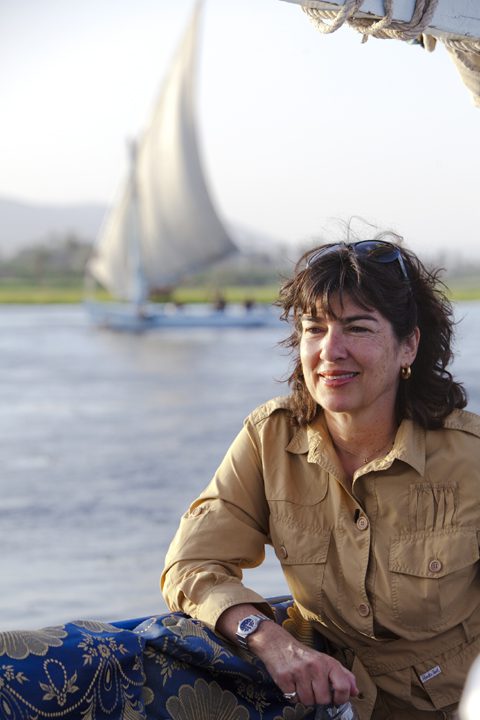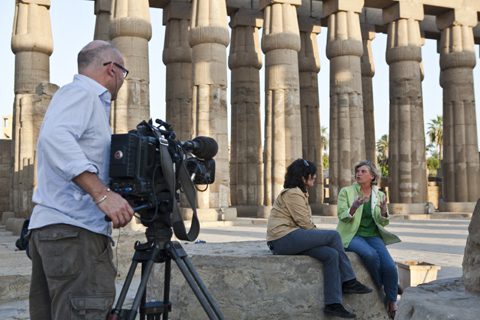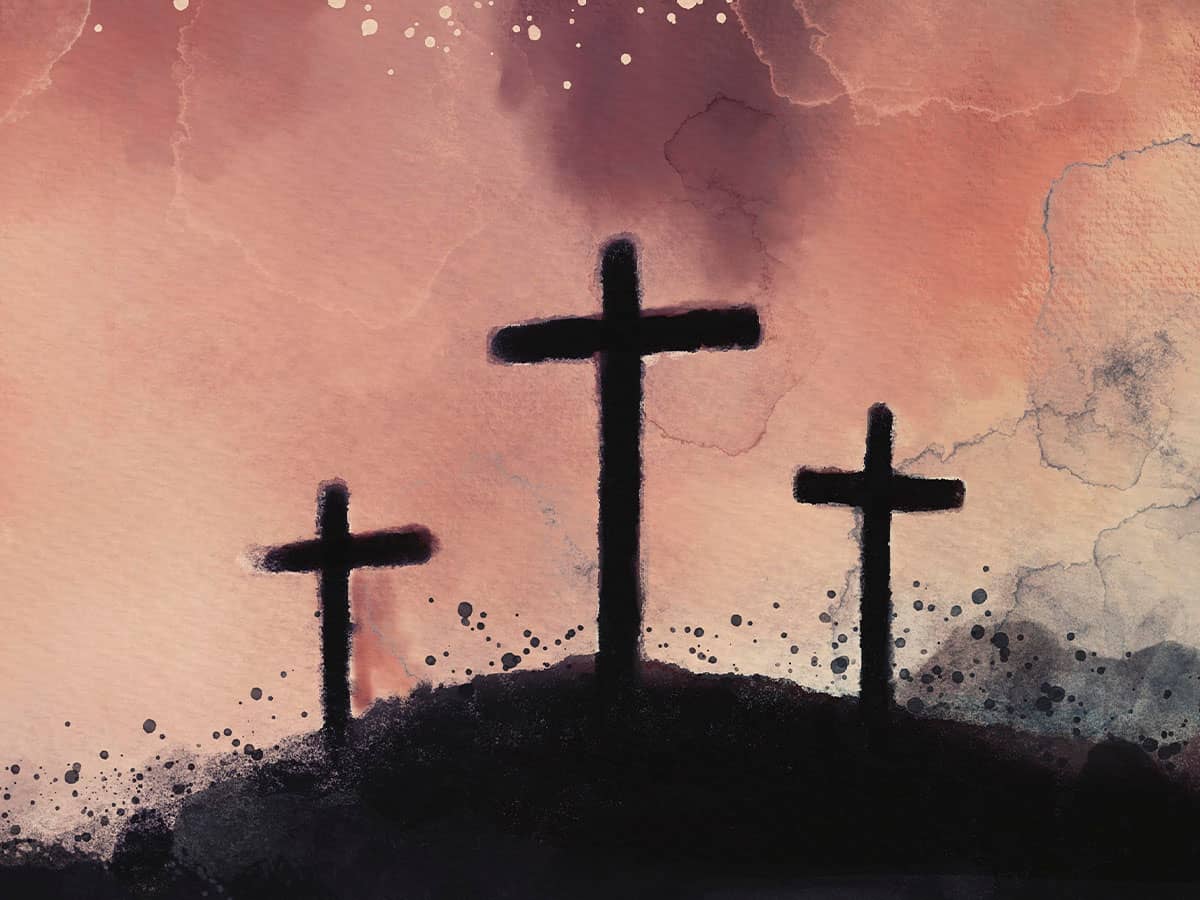Christmas has unique memories for international journalist Christiane Amanpour, the ABC News Global Affairs Anchor. As a small child, she remembers wonderful times, “my family with a Christmas tree and presents and a family gathering.”
Christiane Amanpour. Photo by Shawn Baldwin, ABC News
But her father was Muslim. Her mother was Catholic. They lived in Iran. Little Christiane grew up in a clash of worlds – yet it was quieter than today. “We had Christmas off from school, but,” she notes, “remember, Iran was not yet an Islamic republic.”
During her childhood, the former Persian Empire was one of the most diverse, modern and secular Islamic nations of the Cold War era, led by an iron-fisted dictator whose family had been put in power by the CIA and was one of America’s top allies – the controversial Shah of Iran.
Amanpour – now a regular on the ABC nightly news as well as Chief International Correspondent for CNN and the nightly host of her own interview program on CNN International – remembers an Iran vastly different in the 1960s and 1970s from today’s terror-exporting, nuke-developing Islamic republic whose president annually vows before the United Nations to destroy both Israel and the United States as he ushers in Armageddon and welcomes the return of the Hidden Imam – Shi’ite Islam’s child Messiah.
“We had a Christmas tree, we decorated, we had Christmas celebration,” she recalls. Is observance of the holiday tolerated in today’s rigid Iranian Islamic society? “It may not be open and allowed,” she admits, “but in the privacy of your own home, you do what you will.”
Did her very Christian-sounding first name cause problems as a child? After all, “Christiane” is not at all Iranian nor Islamic.
“It really didn’t,” she says. “My mother is Catholic, my father Muslim and so I’ve grown up with both faiths – and I happen to be married to a man who’s Jewish. So, I have all three faiths running right through my immediate family. It taught me tolerance. It taught me that all three faiths can exist together because we have so much in common.”
Today as Iranian-built rockets pound Israeli neighborhoods, as Israeli helicopter gunships rain death and destruction on Gaza, as civil war rages just miles away in Syria and Iran’s leaders are blamed for
arming many of the combatants, is tolerance still possible?
Filming the ABC Special at Luxor Temple. Photo by Shawn Baldwin, ABC News
“We have more in common than what divides us,” says Amanpour. “But, of course, over recent years, what divides us is more in the forefront — and is being used, I think, by those who would use religion as a political weapon.
“I grew up in Iran until the Islamic revolution in 1979 and it was not yet fundamentalist. The regime was not one that used Islam as the law of the land. Women were free. There was poverty and the difficulties of the oppression that poverty brings. Also it wasn’t a democracy.”
Her parents sent her to boarding school when she was 11, but still she came home for holidays.
“For me it was not difficult,” she recalls. “We went to church, the faiths were respected and actually, you know what, there are still Christian churches in Iran and there are still Jewish Synagogues” – although thousands of Iranian Christians and Jews have since escaped the country. Her own family fled amid the chaos of the Iranian Revolution and the imposition of strict Muslim law administered by ulema – the Shi’ia clergy from local mosques – and rigidly enforced by religious police. Brief trials lacking defense attorneys, juries, transparency or opportunity for the accused to defend themselves were held by shari’a-enforcing Islamic judges. Amnesty International documented 2,946 executions in the first two years for everything from drug and sexual offenses to “corruption on earth.”
But this was not the Iran that Amanpour grew up in. Hers was an Iran rich in thousands of years of history and culture and diversity.
“One of the things that I find phenomenal is that it was, in fact, an ancient Persian king, Cyrus the Great who defeated the Babylonians and enabled Jews to come back and to rebuild their temple in Jerusalem.” Indeed, that story is told in the Bible’s books of Daniel, Ezra and Nehemiah.
“This is very important,” says Amanpour. “Today people forget. People don’t focus on that kind of stuff because so much of the division that separates us. The differences have dominated our consciousness.”
How did such a culturally diverse upbringing affect her as an adult? How would she describe her own personal faith as a result of such a childhood?
“Well you know,” she says, somewhat reservedly, “Without wanting to be too – as you know, faith is a private thing. However, just to say that I have grown up with these three great Abrahamic monotheistic faiths.
“The first-ever monotheist was Zoroaster from ancient Persia, so I have all of that in my blood and in my bones and I do practice and I am teaching my son the traditions of faith, Jewish and Christian, and because his father is Jewish and my mother is English and Catholic,
I have also opened his eyes to the fact that there is such commonality and to respect religion and respect the tradition and to respect the values taught.”
Amanpour talks to Egyptian archaeologist Zahi Hawass. Photo by Shawn Baldwin, ABC News
That’s been one of her goals for the ABC Primetime Special “Back to the Beginning,” scheduled to air on December 21 and 28. For the segments in Egypt and the Sinai desert, she took along12-year-old, Darius.
“I wanted to show people that it’s OK to visit these places even with your kids,” she says. “It’s part of the story, handing down these stories generation to generation. It was incredible to take my son with me and to show him what I do – and the incredible privilege I’ve had being able to travel the world.
“I want him to learn so much about it all and I want to increase the body of knowledge that I have in order to be able to tell these stories and these important events.”
Did the trip change Darius? What did he bring back from the adventure?
“I believe the experience gave him a huge amount of knowledge,” she says, “and so, like all curious and inquisitive and active pre-teens, he was really interested. It’s fantastic to see all these places through a child’s eyes. It gave him a sense of ‘Wow, I hear about Moses and I read his story. I did my school project on Martin Luther King and he spoke about the Promised Land.’ So many freedom fighters take their inspiration from Moses. He and I we climbed Mount Sinai all the way up to the top. It was just phenomenal for my son to be able to see where it all happened.”
Do she and Darius and her husband celebrate Christmas?
“Well, you know, Christmas is about family,” she says. “It’s about presents and holidays and carol-singing. It’s about going to church and it’s about doing all that.
“I think for myself, the parts of Christmas that are applicable, I think, so much – in our coverage and so much in my daily life — are the
the incredible teachings about justice, social justice, the incredible biblical teachings about forgiveness, about having a set of moral values about welcoming strangers and hospitality.”
Such hospitality was extended to her one memorable Christmas when she was in college and sharing a house with several other students, including John F. Kennedy Jr.
“John’s birthday just passed and he would have been 52 years old,” she muses. “I believe he would have been a great and positive force in this country. All of us who loved him and all of us who were his friends and, of course, his family you know, never stop missing him.
“Especially at Christmas, I never stop missing his friendship and his charisma and the tragic loss of an opportunity for him to display his full potentials for America and the world.
“I spent one of my Christmases away from home with John and his family, his mother and his sister – the Christmas of 1989. I was a low-level reporter at CNN. I was based here in New York. It was my last Christmas in the United States before I was sent abroad to cover the unfolding revolutions in Central Europe, do you remember the Iron Curtain coming down?
“The last revolution was in Romania and, in fact, on Christmas day, the former president of Romania, Ceausescu and his wife were executed and we watched that on television. I remember watching with John and marveling at how it was all happening.
“A couple days later I was sent as a producer into the field and I never came back. I’ve been on assignment virtually ever since. I went on to cover the Gulf War in 1990 and that was the beginning of my career as a correspondent. So, that Christmas of 1989 we spent together is special and wonderful. I will never forget it.”
Did she jump into that assignment with an advantage – having grown up there?
“I think it gives me an edge,” she says. “I think it allowed me to move freely without having to fear. It allows me to understand the culture and the nature of the place that I’m going into and to be able to look at it from a different perspective.
“I try to explain things to our viewers, things that they may not immediately grasp. I try to show different sides. I think everybody goes into whatever they do with a certain perspective from their childhood, from their upbringing, from their own experience.
“Mine is unique in that I not only grew up in a part of the world which was not always so important to the West. I believe have a slight edge. I believe I have an ability to cut through a lot of the confusion and to be able to relate and to understand.
“From my childhood, I know it’s not all about conflict and there is so much more that unites us than divides us.”
Amanpour at Luxor Temple. Photo by Shawn Baldwin, ABC News
The first part of her ABC News Primetime Special “Back to the Beginning” airs Friday night, December 21. She bills it as “the ultimate road trip" as she travels to the lands of the Bible to explore the powerful stories from Genesis to the Birth of Jesus. Using the Old Testament as a guidebook, "Back to the Beginning" peels back the layers of history and faith that has inspired billions, she says. Part two is scheduled to air a week later, Friday, December 28.




